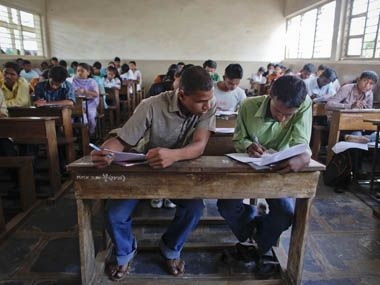Japan Dropped Nuclear Bomb On U.S. In World War II, Pakistan’s Real Name is ‘Islamic Islamabad’: Indian Textbook

A history textbook used in some state-run schools in the western Indian state of Gujarat makes some of the following claims: Japan dropped a nuclear bomb on the United States during World War II, and Gujarat native Mahatma Gandhi was killed in October 1948. In reality, it was the U.S. that nuked Japan, while Gandhi was shot to death by an assassin’s bullet nine months earlier, in January 1948.
Other books claim that Indian nationalists like Dadabhai Navroji, Surendranath Bannerjee and Gopal Krishna Gokhale were considered to be “extremists” within the Congress Party prior to independence – in fact, they were regarded as moderates at the time. NDTV, an Indian broadcasting network, reported that the books, which boast many other factual errors, were published by the Gujarat government’s Council of Educational Research and Training (GCERT), and designed for students in grades six through eight. In one particularly egregious case, a social science textbook for eighth-grade students included more than 120 factual errors and mistakes in spelling and grammar. The Times News Network (TNN) news agency reported that the faulty textbooks are being used by more than 50,000 children in scores of schools across the state.
NDTV noted some of the other bizarre and awkward passages in the textbooks, including: "The neighboring Pakistan is an Islamic Islamabad Nation.” TNN cited that the books allege that the capital of Pakistan (aka "Islamic Islamabad") is “Khyber Ghat” in the Hindu Kush mountain range, rather than Islamabad. The Hindu newspaper cited other bizarre errors: All South Indians are “Madrasis” (that term is actually a slur on people from southern India). The text also described the people of eastern India like this: “People in east India wear clothes above ankle as there is more rainfall. Ladies wear sari in a peculiar manner.” It also alleges that people in eastern India live in “houses made of wood and bamboo.”
Parents of some of the schoolchildren in Gujarat, as well as teachers and principals, are outraged by the poor quality of the books. "This clearly is the reflection of the competency of the writers of the [books] and even competency of the translators... there should have been some semblance of sensibility while clearing the draft of these books," said Nirav Thakkar, principal of the A.G. High School in Ahmedabad.
Another scholar was similarly perplexed. "What is surprising is why basic checks were not carried out before circulating the books? Books for classes 6, 7 and 8 have been out in the market for quite some time now and the state government did nothing to spot it also," said Vasant Bhatt, director of a school of languages.
The state government has ordered an investigation into the books, but they remain in classrooms. "We have set up a two-member committee to look into these errors and make changes immediately. We are also initiating action against the panelist who had vetted the books," state Education Minister Bhupendrasinh Chudasama said in a statement. The executive president of Gujarat state board of school textbooks, Nitin Pethani, told TNN that his organization is collecting all the errors and will publish them on the Internet. “We cannot recall the books at this stage. But we give an assurance that we will correct the mistakes," he said. Pethani blamed the errors on “poor translation” from Gujarati to English.
However, the damage may already have been done since the books are in circulation and tens of thousands of young eyes have read them. “The books reflect the intellectual poverty of the authors,” social and political scientist Achyut Yagnik told The Hindu. “This is not new with the present set of textbooks, the situation was similar with even the earlier versions.”
© Copyright IBTimes 2024. All rights reserved.




















